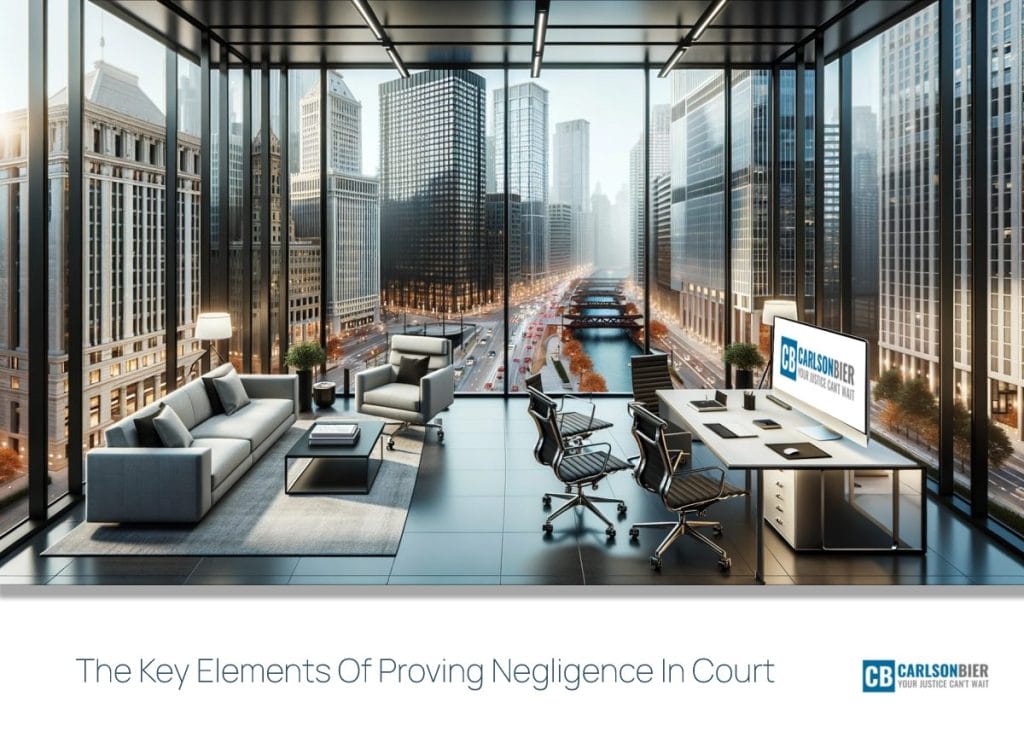Understanding the Fundamentals of Negligence
As the reputable Law Office of Carlson Bier Associates, we represent individuals across Illinois who have been injured because of the negligent actions of another party. A cornerstone of personal injury law, negligence is usually at play in cases such as automobile accidents, slip-and-fall incidents, medical malpractice, and a slew of other types of personal injury litigation. But what exactly constitutes negligence and how do you go about proving negligence in court? Let’s delve into the key elements required to establish negligence in a court of law.
Defining Negligence
In regards to tort law, negligence concerns harm that is caused by a failure to observe a duty to act with care. In essence, someone is considered negligent if they have acted in a manner that a prudently reasonable person would not have under the same circumstances. It’s worth noting here that everyone is legally obligated to exercise a certain degree of care in their interactions with others to prevent causing unnecessary harm or injury. However, to pinpoint negligence, one must dig down to four main components: duty, breach, causation, and damage.
The Four-Part Test for Negligence
The test for negligence is divided into four distinct parts. It’s not enough to simply accuse someone of acting negligently without establishing these four crucial elements in court:
1. Duty of Care
The first step in proving negligence revolves around demonstrating that the defendant (the one being accused) owed you (the plaintiff) a duty of care. For instance, doctors owe their patients a professional standard of care, which stands for necessary attention and skill in their practice.
2. Breach of Duty
Once it’s established that a duty of care was expected, the next task is to determine whether the defendant breached that duty. Essentially, you need to demonstrate that the defendant failed to act in the expected manner which a reasonable person would have in a similar circumstance. Suppose a motorist was texting and driving, which led to an accident. The plaintiff can argue that a reasonable person would not engage in such risky behavior while driving, indicating a breach of duty.
3. Causation
The third core element of proving negligence in court is causation, which involves proving that the defendant’s breach of duty was the direct cause of your injury or loss. The litmus test here is ‘but-for’ causation; but for the defendant’s breach of duty, the injury would not have occurred.
4. Damage
Lastly, it must be demonstrated that you suffered some form of damage because of the defendant’s negligent actions. This could be physical harm, financial loss, or even emotional distress. If you can’t show that you have suffered damage as a result of the breach, you won’t have a case.
Providing Concrete Evidence
Of course, mere accusations of negligence are of little value without substantial evidence. Witnesses, photographs, video footage, medical records, and expert testimonies can all be used to strengthen your case. It’s worthwhile seeking a seasoned personal injury attorney to assist in collecting and presenting the right pieces of evidence.
Negligence and Illinois Law
Every state has its unique set of laws concerning negligence, and Illinois is no exception. Illinois law employs a modified comparative negligence rule, which means an injured party can recover damages as long as they are less than 50% at fault. Our attorneys at Carlson Bier Associates are well-versed with these specific guidelines and can help you navigate these legal waters effectively.
The Role of Legal Expertise in Proving Negligence
Without a doubt, proving negligence requires a nuanced understanding of the law and careful handling of the evidence. Expert legal advice from a seasoned law firm like Carlson Bier Associates can be crucial in ensuring that your rights are upheld and any warranted compensation is attained. For a more comprehensive understanding of proving negligence, consider visiting the Illinois Courts website.
Ensuring Successful Negligence Litigation
In conclusion, the journey towards proving negligence and receiving fair compensation can be daunting, especially when dealing with the complexities woven into the legal landscape. As Carlson Bier Associates, we’re committed to helping you understand negligence concepts, tailoring a compelling case, and pushing towards a just resolution on your behalf. The four-part test for negligence, backed by concrete evidence and expert legal guidance, can be instrumental in achieving a successful outcome in your negligence case.

